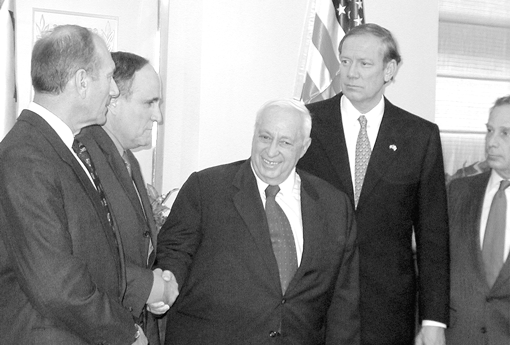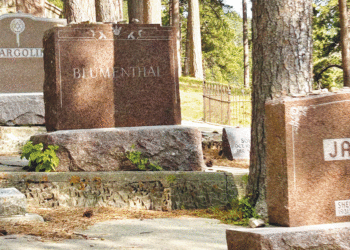In early December 2001, I traveled to Israel with 107 other Jewish Twin Citians on a federation-sponsored “solidarity mission.” It was in the aftermath of the 9/11 terrorist attacks — the site of the Twin Towers in lower Manhattan was still smoldering, as we could see from the airplane — and Israelis were reeling from recent terrorist attacks, too.
A few days before we arrived at Ben-Gurion Airport, two Palestinian suicide bombers set off their explosives vests at opposite ends of a block on Jerusalem’s Ben Yehuda Street. The bombers killed 11 young Israelis and wounded 175 others, who were out celebrating the end of Shabbat on the pedestrian mall. The carnage in Jerusalem was followed 12 hours later by a suicide bombing on a bus in Haifa that killed 15 souls; dozens more were wounded.
I remember people coming up to me, in shops and on the street, thanking me for visiting Israel, at that time of great stress and sorrow. Our mission tour continued as planned, although some of the groups we visited expressed surprise that we had not cancelled the trip.
On Dec. 9, I took advantage of a photo opportunity at the prime minister’s office. Ariel Sharon was welcoming a group of New York elected officials, along with a few Jewish machers, who flew to Israel to express their support.
The group included New York Mayor Rudy Giuliani, New York’s mayor-elect, Michael Bloomberg, and New York Gov. George Pataki.
So, I was across a conference table from Sharon, snapping photos for a few seconds. And then I joined the New York press contingent for a ceremony that evening, in Zion Square — near the site of the Dec. 1 suicide bombings — marking the first night of Hanuka. Giuliani lit the first candle on the hanukia, and Sharon and the New Yorkers spoke, on a stage set in the middle of several concentric circles of security checkpoints.

- Ariel Sharon (third from left), who was then the Israeli prime minister, shakes hands with New York City Mayor Rudy Giuliani. The photo op in the prime minister’s Jerusalem office, on Dec. 9, 2001, also included Jerusalem Mayor Ehud Olmert (far left); New York Governor George Pataki (second from right); and Michael Bloomberg (far right), who was the New York mayor-elect. (Photo: Mordecai Specktor)
After lingering in a state of minimal consciousness for eight years, Sharon, who rose from military commander to Israeli premier, died last Saturday, Jan. 11.
Nicknamed the “Bulldozer,” Sharon was wide of girth and hugely controversial in his various roles as a soldier and statesman over many decades. Numerous tributes to the late Israeli leader have been e-mailed to the AJW. B’nai B’rith International, for example, noted that “the history of Ariel Sharon and the history of Israel could not be more intertwined. Sharon was present at the birth of a nation, when he commanded an infantry company in the 1948 War of Independence. Each time Israel was threatened with extinction, Ariel Sharon rose to defend her.”
At the same time, Sharon’s critics span the political spectrum. Right-wing Israeli Jews hate Sharon for the 2005 pullout of settlers and soldiers from the Gaza Strip. An op-ed in the Jewish Press (N.Y.) expressed sympathy with yeshiva students who believed that Sharon was an “evil man,” and that God punished him with a debilitating stroke.
On the left, Israelis, and Palestinians, decry Sharon’s role in the IDF special forces Unit 101’s massacre of dozens of women and children at Qibya, in 1953. He also is pilloried for presiding over the significant expansion of West Bank settlements during his stint as agriculture minister. And as defense minister, in 1982, Sharon defied Prime Minister Menachem Begin’s orders, took IDF troops far into Lebanon and laid siege to Beirut.
On Sept. 16, 1982, while the IDF encircled the Palestinian refugee camps of Sabra and Shatila, members of a Lebanese Christian militia entered the camps and went on a killing spree. Hundreds of men, women and children were slaughtered. A subsequent Israeli investigation into the massacre, the Kahan Commission, found that Sharon “bears personal responsibility” for the mass murder. Begin did not remove Sharon from his post as defense minister; but Sharon eventually resigned and stayed in the Cabinet as a minister without portfolio. Of course, he rose like the proverbial phoenix and became prime minister of Israel in 2001.
In some remembrances of Sharon, we read that late in life he realized the limits of military force, as evidenced by the 2005 Gaza “disengagement.” However, Sharon’s senior adviser, Dov Weisglass, told Ari Shavit that the “significance of the disengagement plan is the freezing of the peace process.”
As reported in the Oct. 6, 2004, edition of Haaretz, Weisglass said, “And when you freeze that process, you prevent the establishment of a Palestinian state, and you prevent a discussion on the refugees, the borders and Jerusalem. Effectively, this whole package called the Palestinian state, with all that it entails, has been removed indefinitely from our agenda.”
Weisglass added that the Gaza disengagement also enjoyed “a [U.S.] presidential blessing and the ratification of both houses of Congress.”
Shavit quoted Weisglass: “The disengagement is actually formaldehyde. It supplies the amount of formaldehyde that is necessary so there will not be a political process with the Palestinians.”
Israeli author and commentator Bernard Avishai, writing in the New Yorker, concluded that “Sharon’s fate was to take the truths of old Zionist settlement to heart and, face down, unable or unwilling to appreciate the larger human story that animated them, to turn them grotesque. His death may now inspire an effort to reach peace. If that comes to pass, then may his memory be blessed. But his life’s work has placed before peacemakers almost unimaginable obstacles.”
— Mordecai Specktor / editor@ajwnews.com
(American Jewish World, 1.17.14)




















